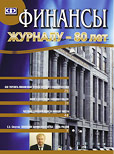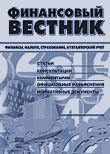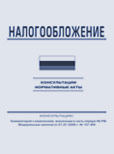Содержание
Актуально
E-mail: sov@minfin.rk.gov.ru
Интервью с министром финансов Республики Крым И.В. Кивико, в котором она подробно рассказала о доходах и расходах республиканского бюджета, о трудностях, которые возникали в связи с переходным периодом, об успехах экономики республики, которые положительно отражаются на доходной базе.
Ключевые слова: интеграция в финансовое поле РФ, доходная часть бюджета, расходы, свободная экономическая зона.
Юбилей
Редколлегия и редакция журнала поздравляет с юбилеем Александра Алихановича Ахполова, Директора Административного департамента Министерства финансов Российской Федерации.
Финансы и бюджет: проблемы и решения
Г.Я. Шахова, главный научный сотрудник Центра перспективного финансового планирования, макроэкономического анализа и статистики финансов Научно-исследовательского финансового института Минфина России, доктор экономических наук
E-mail: gshahova@nifi.ru
В статье освещаются место и роль долгосрочного бюджетного планирования в бюджетном процессе. Особое внимание уделяется разработке сценариев социально-экономического развития, параметры которых целесообразно использовать в качестве исходных предпосылок для долгосрочных бюджетных проектировок. Рассмотрены налогово-бюджетные маневры, выполнение которых может обеспечить устойчивость бюджетной системы и реализацию приоритетов социально-экономического развития в долгосрочном периоде.
Ключевые слова: долгосрочное бюджетное планирование, долгосрочная бюджетная устойчивость, государственные доходы, государственные расходы, бюджетный баланс.
К 90-летию журнала
В Ф. Гарбузов, Министр финансов СССР
«Победа Советского Союза в Великой Отечественной войне со всей полнотой раскрыла преимущества социализма, его огромные экономические, социаль¬но-политические и духовные возмож¬ности. Это была Победа созданного великим Лениным Советского государ¬ства, самого передового общественного строя, социалистической экономической системы…». Эта статья – публикация 1985 года. Перепечатка (с сокращением) осуществлена в связи с 90-летним юбилеем журнала «Финансы».
Помним победу
О.А. Антонюк, заведующий кафедрой финансов и управления банковской деятельностью в ВС Военного университета МО РФ, доктор экономических наук, профессор, заслуженный экономист РФ
E-mail: pr.antonjuk@mail.ru
22 июня исполняется 75 лет со дня начала Великой Отечественной войны, которая длилась 1418 дней и ночей и унесла более 27 миллионов жизней советских людей. Среди тех, кто ковал Победу, были десятки тысяч финансистов, бухгалтеров, банковских служащих. Многим из них для защиты Отечества пришлось взять в руки оружие. Но особое место занимают военные финансисты. Статья посвящена их работе в тяжелые годы, а также мемориалам, открытым в их честь.
Ключевые слова: военные финансисты, финансирование поставок вооружения, Аллея Памяти, Книга Памяти и Славы.
Казначейство: становление и развитие
И.С. Тапсиев, руководитель УФК по Ставропольскому краю, кандидат технических наук, доцент
А.В. Бондарчук, заместитель министра финансов Ставропольского края
E-mail: okoibufksk@mail.ru
Статья посвящена одному из направлений минимизации стоимости обслуживания долговых обязательств субъектов РФ – бюджетным кредитам, которыми регионы могут заменить более дорогие коммерческие заимствования. В этом материале рассматриваются правовые основы и правила предоставления бюджетных кредитов за счет остатков средств на едином счете федерального бюджета.
Ключевые слова: бюджетные кредиты, единый счет федерального бюджета, краткосрочные бюджетные кредиты.
Информация о заседании Совета, которое состоялось 27 мая. 2016 года.
На вопросы читателей отвечают специалисты Минфина России и Федерального казначейства.
Налоги: теория и практика
С. В. Ануреев, профессор кафедры финансового менеджмента Российского экономического университета им. Г.В. Плеханова, приглашенный профессор экономического факультета МГУ имени Ломоносова, доктор экономических наук
E-mail: anureev@bk.ru
Перегруженность дорог и метро в Москве давно является острейшей проблемой для города, а борьба с пробками – одной из самых «дорогих» программ для городского бюджета. Данная проблема усугубляется режимом работы многих отраслей и крупных работодателей, полагающихся на стандартную восьмичасовую пятидневку. Одновременно многие работают посменно или дистанционно, что сдвигает поездки работников за границы пиковых часов.
Автор полагает, что государство с помощью транспортного сбора способно простимулировать переход компаний и организаций на режим работы, снижающий пиковые нагрузки. Предлагаемый к введению транспортный сбор имеет квазиналоговый характер, скорее выступает в роли платной государственной услуги и комбинируется с обязательной покупкой работодателем парковочного абонемента или абонемента на общественный транспорт. Такой сбор налагается на работодателя дифференцированно в зависимости от графика и маршрута поездок сотрудников. Данные предложения основаны как на отечественном опыте, так и решениях крупнейших мегаполисов планеты.
Ключевые слова: неналоговые сборы, платные государственные услуги, тариф на общественный транспорт, бюджетное субсидирование, льготные парковочные абонементы.
А.А. Пугачев, ведущий аудитор Северного банка ПАО «Сбербанк России», ассистент кафедры финансов и кредита Ярославского государственного университета им. П.Г. Демидова
E-mail: andrxim@yandex.ru
В условиях турбулентности экономического развития и необходимости бюджетной консолидации вопросы совершенствования российской модели налогового федерализма имеют первоочередное значение. Развитие налоговой конкуренции на субфедеральном уровне является одним из таких направлений, не требующим изменения ключевых параметров налоговой системы. В статье даются примеры налоговой конкуренции, в ходе которой субъекты Федерации соревнуются за привлечение бизнеса его регистрацию.
Ключевые слова: модель налогового федерализма, налоговый потенциал региона, налоговая конкуренция, бюджетная система, федеральный бюджет.
Е.Е. Великова, старший научный сотрудник, РАНХиГС
E-mail: velikova@ranepa.ru
А.Н. Мамбеталиева, научный сотрудник Института экономической политики им. Е.Т. Гайдара, кандидат юридических наук
E-mail: aigerimm@gmail.com
Статья посвящена анализу Конвенции об оказании административной помощи по налоговым делам, а также принятию новых обязательств Российской Федерации в связи с ратификацией указанной Конвенции. Анализируются модули по обмену налоговой информацией между членами ОЭСР и сотрудничающими с ней странами, участие ФНС в «одновременных проверках» с участием других государств.
Ключевые слова: конвенция, ОЭСР, директива Евросоюза, налоговые дела, административная помощь, одновременные налоговые проверки, проверки за границей.
Страхование
П.А. Козлов, советник первого заместителя председателя правления Пенсионного фонда России, аспирант кафедры управления рисками, страхования и ценных бумаг, Российский экономический университет им. Г.В. Плеханова
E-mail: pavel.kozlov01@mail.ru
Глобальный кризис подтолкнул отечественную экономику к поиску новых путей развития системы обязательного пенсионного страхования. В статье проанализированы последствия повышения совокупной ставки страховых взносов на обязательное пенсионное страхование за счет введения уплаты 2% трудящимися. Дополнительно рассчитаны последствия отмены предельной базы для начисления страховых взносов в ПФР. Сделан вывод о необходимости применения всей совокупности мер во избежание дефицита системы обязательного пенсионного страхования.
Ключевые слова: система обязательного пенсионного страхования, дефицит бюджета ПФР, ставки страховых взносов на обязательное пенсионное страхование, стоимость одного процента страховых взносов.
Э.С. Гребенщиков, кандидат исторических наук
E-mail: finance-journal@mail.ru
Анализируются итоги 2015 страхового года и оцениваются долгосрочные тенденции развития немецкого страхового рынка. Опираясь на статистические сборники и пресс-релизы Германского страхового союза страховой отрасли (GDV), автор отмечает стабильную расстановку сил на немецком страховом рынке, растущую долю страховых премий в ВВП (несмотря на не во всем благоприятную макроэкономическую среду, старение населения, необходимость защищать даже ценой эффективности финансовые вложения граждан и их персональные данные, что особенно важно для медицинского страхования), доверие к страховщикам, которое выражается в увеличении расходов населения на приобретение страховых услуг. Больше место на внутреннем рынке ФРГ занимают страховщики из других европейских стран, в то время как немецкие перестраховочные гиганты являются крупнейшими глобальными операторами.
Ключевые слова: страховые премии, доля в ВВП, инвестиции страховщиков, дигитализация страхового бизнеса, пределы разумного надзора.
Э.С. Гребенщиков, кандидат исторических наук
E-mail: finance-journal@mail.ru
Исследуются причины, позволяющие страхованию жизни (речь о долгосрочном накопительном страховании) демонстрировать в России высокие темпы роста (как премий, так и выплат), несмотря на рецессию в российской экономике и сокращение доходов населения. К их числу относятся умелый менеджмент, поддержка акционеров, возможность выгодно размещать резервы на облигационном рынке, дающем высокую доходность. Рынок страхования жизни выглядит как благополучный сегмент страхового рынка, наращивающий свою инвестиционную функцию.
Ключевые слова: накопительное и инвестиционное страхование жизни, АСЖ, доходность по облигациям, поддержка акционеров, саморегулирование.
А.П. Архипов, профессор
E-mail: aarkhipoff@yandex.ru
Краткая информация о состоявшемся в г. Грозном в середине мая т.г. научно-практическом семинаре, на котором обсуждались меры по развитию финансовых, страховых и банковских рынков, оценивались внутренние источники финансирования инновационных проектов.
Ключевые слова: региональные рынки, подходы, соответствующие наличным ресурсам, корпоративные финансы.
Annotation
E-mail: sov@minfin.rk.gov.ru
Interview with the Minister of Finance of the Republic of Crimea I.V. Kiviko, in which she told in details about the incomes and expenditures of the republican budget, about the difficulties which arose in connection with the transition period and about the successes of the Republic’s economy which positively affect the revenue base.
Keywords: integration in the financial field of the Russian Federation, revenue part of the budget, expenditures, free economic zone.
Editorial board and editorial of the journal congratulates Alexander Alikhanovich Akhpolov – Director of the Administrative Department of the Ministry of Finance of the Russian Federation with the anniversary.
G.Ya.Shakhova, doctor of economics, chief researcher of the Advanced Financial Planning, Macroeconomic Analysis and Finance Statistics Center, Financial Research Institute
E-mail: gshahova@nifi.ru
The article reviews place and role of long-term budget planning in the budget process. Special attention is paid to preparation of macroeconomic scenarios as underlying assumptions for long-term budget projections. Some tax and budget maneuvers, which will be useful for achieving the sustainability of public finance over an extended period and realizing of social and economic priorities, are presented.
Keywords: long-term budget planning, long-term budget sustainability, government expenditures, government revenues, budget balance.
GV.D. Gazman, doctor of economic sciences, professor of the National Research University “Higher School of Economics”
E-mail: garantinv@bk.ru
Article according to the results of the author’s survey of leasing market provides new statistics on the cost and portfolio of leasing agreements in the country; leading lessors; considers specific structure of leasing market by its segments; defines labor productivity in leasing and urgency of contracts; structure of financing of leasing operations and compares the proportions of borrowings on Bank and non – Bank leasing companies; considers initiatives of the Bank of Russia on leasing regulation and provides the calculations of nominal and real average annual rise in price of leasing.
Keywords: leasing, source of financing, advances, leverage, leasing companies at banks, average annual rise in price of leasing.
V.F. Garbuzov, Minister of Finance of the USSR.
“Soviet Union’s Victory in the Great Patriotic War fully revealed the advantages of socialism, its huge economic, socio – political and spiritual opportunities. It was the Victory of Soviet Union created by the great Lenin, the most advanced social system, socialistic economic system… ”
This article is a publication of 1985 year. Reprint (with the reduction of text) was carried out in connection with 90th anniversary of the “Finance” journal.
O.A. Antonjuk, head of chair “Finance and Management of Banking Activities in the Armed Forces” of the Military University of the Defense Ministry of the Russian Federation, doctor of economic sciences, professor, honored economist of the Russian Federation
E-mail: pr.antonjuk@mail.ru
On 22nd of June the will be 75 years since the beginning of the Great Patriotic War, which lasted 1418 days and nights and claimed the life of more than 27 millions of Soviet people. Among those who forged the victory there were tens of thousands of financiers, accountants and bankers. Many of them had to take up arms to defend the Fatherland. But the special place is occupied by the military financiers. Article is devoted to their work in difficult years and also to memorials opened in their honor.
Keywords: military financiers, financing of arms supplies, Alley of Memory, Book of Memory and Glory.
I.S. Tapsiev, head of Administration of the Federal Treasury across the Stavropol region, candidate of technical sciences, associate professor.
A.V. Bondarchuk, deputy Minister of Finance of the Stavropol region.
E-mail: okoibufksk@mail.ru
Article is devoted to one of directions of minimizing the cost of servicing debt obligations of subjects of the Russian Federation - budget credits using which the regions can replace more expensive commercial borrowings. This material considers the legal frameworks and rules of granting of budget credits at the expense of balances of funds on the single account of Federal budget.
Keywords: budget credits, single account of Federal budget, short – term of budget loans.
Information about the meeting of the Council held on 27th of May 2016.
Specialists of the Ministry of Finance of Russia and Federal Treasury answer the questions of readers.
S.V. Anureev, professor of chair “Financial Management” of the Plekhanov Russian University of Economics, invited professor of Economic Faculty of the Lomonosov Moscow State University, doctor of economic sciences.
E-mail: anureev@bk.ru
The tool of fighting traffic congestion, stimulation of flexible working schedule and rational financing of transport infrastructure.
Traffic congestion is obviously one of the biggest problem for Moscow and the city government spends one of the biggest budgetary money to long-term solution of the problem. In summer or during off-peak hours the traffic is noticeably less, when the number of travelers is around ? less. The fundamental reason of the traffic congestion is conventional 8/5 working schedule preferred by majority of industries and employers. However, any other industries prefer 12 hours shifts or flexible schedules, which move their employees’ traveling out of peak time hours.
Majority of employers do not ready to move out of conventional schedule, and the government should stimulate the movement by transport charge. Offered transport charge bases on the public finance theory of user charges as better alternative of general taxation and budgetary subsidies. Transport charge is also combined with mandatory parking fee paid by employers or their subsidizing of employees’ movements by public transport. The most important the charge feature is its differentiation based on an employer working schedule – how the schedule is out of conventional 8/5 and consequently how employees usually travel out of peak hours. The offered solution is based on several cases from Moscow reality and also from other biggest agglomerations.
Keywords: traffic congestion management, user charges, parking fee, public transport tariff, budgetary subsidies.
A.A. Pugachev, leading auditor of the Northern Bank of Public Joint-stock Company Sberbank, assistant of chair “Finance and credit” of the P. G. Demidov Yaroslavl State University
E-mail: andrxim@yandex.ru
Questions of improvement of model tax federalism in context of the turbulence of economic development and the need for budgetary consolidation are paramount. The development of tax competition in the sub national level is one of these directions. It doesn’t require changes in the key parameters of the tax system.
Keywords: model tax federalism, tax potential of a region, tax competition, budgetary system, federal budget.
E.E. Velikova, senior research officer, Russian Presidential Academy of National Economy and Public Administration.
E-mail: velikova@ranepa.ru
A.N. Mambetalieva, research officer of the Gaidar Institute for Economic Policy, candidate of jurisprudence
E-mail: aigerimm@gmail.com
The article is focused on the analysis of the Convention of Mutual Administrative Assistance in tax cases and on the new responsibility of the Russian Federation based on the ratification of this Convention.
Keywords: convention, OECD, tax cases, administrative assistance, simultaneous tax examinations, tax examinations abroad.
P.A. Kozlov, advisor to the first deputy chairman of the Pension Fund of Russia, post-graduate student of the Department for risk management, insurance and securities, Plekhanov Russian University of Economics
E-mail: pavel.kozlov01@mail.ru
The global crisis has pushed the national economy to the search of new ways of mandatory pension system development. In the article are analyzed the effects of total rate of insurance contributions for compulsory pension system increase by introduction of 2% payment for workers. In addition, the effects of the limit framework for the calculation of social contributions abolition are calculated. It is concluded that there is a necessity of application of set of measures to avoid the mandatory pension system deficit.
Keywords: mandatory pension system, PFR budget deficit, insurance contribution rate for mandatory pensions, cost of social contributions’ one percent.
E.S. Grebenschikov, candidate of historical sciences
E-mail: finance-journal@mail.ru
Citing GDV statistical Year books and other publications the author presents “satisfactory” results achieved by German insurers in 2015 and evaluates the long term prospects of the local insurance market. Dr. Grebenshchikov states that insurance industry is doing better than other industries in Germany since the share of premium income in GDP is on the rise. The stable or even formidable position has been achieved despite adverse general economic environment with its extremely low interest rates. An average German is willing to pay more for medical insurance and possesses half a dozen insurance policies. Insurance providers confront aging population, have to pay more for the security of the financial investments of citizens in the long term policies and take care about protection of the personnel data of the customers. They have to convince the regulator BaFin not to impose excessive supervisory requirements. The author considers the following fact: other European insurers have captured the sizable part of the internal German market whereas German largest reinsurers have become global players.
Keywords: insurance premium, share of GDP, investments, digitalization, the limits of reasonable supervision, GDV Jahrbuch.
E.S. Grebenschikov, candidate of historical sciences.
E-mail: finance-journal@mail.ru
Article researches the causes that allow life insurance (talking about long – term cumulative insurance) to demonstrate in Russia high rates of growth (both premiums and payments) despite the recession in the Russian economy and reduction of incomes of population. They include skilled management, support of shareholders, opportunity to profitably place the reserves in the bond market with a high yield. Life insurance market looks like a favorable segment of insurance market, expanding its investment function.
Keywords: accumulative and investment life insurance, Association of Life Insurance, bond yield, support of shareholders, self – regulation.
A.P. Arkhipov, professor.
E-mail: aarkhipoff@yandex.ru
Brief information about the scientific-practical seminar passed in the mid – May 2016 in Grozny, where there were discussed measures on development of financial, insurance and banking markets, also internal sources of financing of innovative projects were estimated.
Keywords: regional markets, approaches corresponding to available resources, corporate finances.











